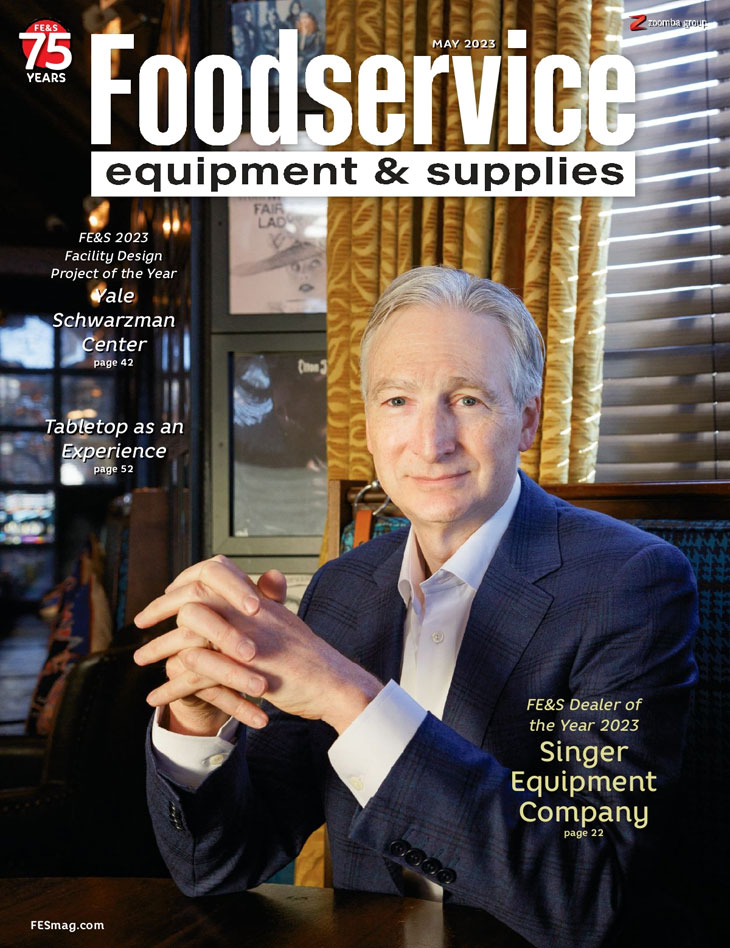HTeaO and Kitchen Social get new investors, while BradyIFS expands its Chicagoland presence. Customer-facing technology continues to evolve but when will the back of the house become a focal point? These stories and more This Week in Foodservice.
“Hello. My name is Tori. Can I take your order?” Don’t know who Tori is? You soon will.
Tori is an artificial intelligence-driven program that can take food orders from the drive-thru. Panera is piloting Tori in Webster, N.Y.
Tori is able to take an order, enter it into the register and pass it along to the kitchen. The technology is able to accommodate those with speech disabilities, accents, and multiple languages. And if there is an order that Tori cannot successfully complete, the staff at the drive-thru can jump in.
This is the latest example of how restaurants continue to employ customer-facing technology to deal with labor issues and meet customers on their own terms, among other things. No doubt, customer-facing technology was a key factor in helping foodservice operators weather the challenges brought forth by the pandemic and the economy. Now that consumers are way more accustomed to app ordering and third-party delivery, it’s only natural to expect things to continue to progress in this area.
Case in point is Starbucks and DoorDash expanding a delivery agreement between the two companies. This week DoorDash added Northern California, Texas, Georgia and Florida to the regions where it will deliver Starbucks orders to customers’ homes, offices, etc. By March of this year, DoorDash anticipates being able to deliver Starbucks orders in all 50 states. This expansion comes on the heels of a successful pilot in Atlanta, Houston, and Sacramento, and additional market expansion in Seattle, Portland, and New York City last year.
That said, though, it would seem the foodservice industry is ready to begin accelerating back-of-the-house technical advancements, too. Labor is less skilled than ever, according to operators from all segments. Pair that with the fact that app and online ordering show no signs of slowing down, which will force operators’ hands when it comes to upping their back-of-the-house tech games.
Failure to do so has the potential to compromise food quality and speed of service, which will ultimately affect sales in a negative way, which nobody wants.
Foodservice News This Week
- Dual and tri-branded units are key items on multiconcept operator Focus Brands’ development menu. The parent company of Auntie Anne’s, Carvel, Cinnabon, Jamba, McAlister’s Deli, Moe’s Southwest Grill, and Schlotzsky’s accelerated its franchise growth by inking development agreements for 65 new dual and tri-brand locations. restaurant development + design has the scoop.
- Cult favorite In-N-Out burger is coming to Tennessee … by 2026, the California-based chain announced. The company will also build a territory office in The Volunteer State, undoubtedly, to support additional expansion East of the Mississippi River. In-N-Out has locations throughout California, Nevada, Arizona, Utah, Texas, Oregon and Colorado.
- Rosser Capital Partners invested in Kitchen Social, a three-unit, small-box, bar-centric, full-service restaurant concept based in Ohio. The investment proceeds are intended to accelerate the concept's growth. Founded in 2019, Kitchen Social now has three brick-and-mortar locations in Columbus, Dublin, and Beachwood, Ohio, with a fourth location under development in Westlake, Ohio. Kitchen Social was founded by Brian O'Malley, the former CEO and COO of Bravo Brio Restaurant Group, with partners Phil Yandolino, Brian Harvey and Justin Stratford.
- HTeaO’s growth plans received the financial equivalent of a caffeine jolt thanks to investments from Crux Capital and Trive Capital. Both firms acquired a minority stake in HTeaO. The Texas-based drive-thru iced tea concept, which has 68 units in operation and another 93 under construction, will use the private equity firm’s financial resources and operational expertise to “enhance our focus on unit-level economics and developing a franchise system at scale,” said HTeaO CEO Justin Howe. As part of the deal Shravan Thadani, partner at Trive Capital, and Wayne Moore, partner at Crux Capital, will become members of HTeaO’s board of directors.
- Disposables and jan/san distributor BradyIFS acquired YPV Distribution, a LaGrange Park, Ill.-based foodservice and jan/san distributor serving the Chicago area. Brothers Peter and John Bouzas, and Vaios Papandreou will continue to lead and manage YPV. This is the third Chicago area acquisition for BradyIFS.
- Growth Chains: Salad and Go entered the Nevada market by opening a location in Las Vegas. The chain plans to open locations in Arizona, Texas, Oklahoma, and Nevada over the course of 2023. Willie's Grill & Icehouse is poised to open a location in Pflugerville, Texas. This will be the 19th unit in Texas for the chain. Fazoli’s plans to open five restaurants over the next six years in Puerto Rico. Working with franchisee Jorge Rodriguez Lockwood, the chain expects the first unit to open in late 2023. Pokemoto, a Hawaiian poke bowl restaurant concept, entered two new markets by opening locations in Texas and New York. Velvet Taco opened three locations in the Dallas-Fort Worth market in Deep Ellum, Grapevine, and Rockwall. Jeremiah’s Italian Ice opened a location in Winter Garden, Fla. It’s the chain’s 100th unit systemwide.
Economic News This Week
- For the week-ending Jan. 7, 2023, initial jobless claims totaled 205,000, down from the previous week’s total of 206,000 claims, per the U.S. Department of Labor. The 4-week moving average was 212,500, a decrease of 1,750 from the previous week.
- The Consumer Price Index declined 0.1% in December, per the U.S. Bureau of Labor Statistics. This comes after a 0.1% increase in November. For the 12 months ending in December 2022, the CPI increased 6.5%, the smallest increase since October 2021, per the BLS. December’s decline is attributed to lower gasoline prices, which more than offset increases in other areas. The food index increased by 0.3% with the food at-home index rising 0.2%. The food away-from-home index rose 0.4% in December, 0.1% less than in November. The index for limited-service meals increased 0.5% over the month and the index for full-service meals increased 0.1%. The U.S. Federal Reserve had been significantly raising interest rates in an attempt to slow inflation and this data may be interpreted as those steps working somewhat. For that reason, many expect the Fed will continue to raise interest rates in the coming year but at a slower rate.
- Consumers’ outlook improved for the second consecutive month. In January the University of Michigan’s Index of Consumer Sentiment totaled 64.6, up from 59.7 in December. The Current Economic Conditions Index hit 68.6, a 9.2-point increase from December. And the Index of Consumer Expectations totaled 62.0, up from 59.9 in December. While any improvement in consumer sentiment should be seen as positive, a university spokesperson also notes consumer sentiment remains at historically low levels. In other words, there’s plenty of work to do when it comes to restoring consumer confidence.




